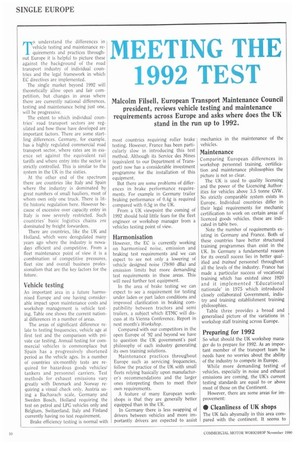MEETING THE 1992 TEST
Page 98

If you've noticed an error in this article please click here to report it so we can fix it.
To understand the differences in vehicle testing and maintenance requirements and practices throughout Europe it is helpful to picture these against the background of the road transport industry of individual countries and the legal framework in which EC directives are implemented.
The single market beyond 1992 will theoretically allow open and fair competition, but changes in areas where there are currently national differences, testing and maintenance being just one, will be progressive.
The extent to which individual countries' road transport sectors are regulated and how these have developed are important factors. There are some startling differences. Germany, for example, has a highly regulated commercial road transport sector, where rates are in essence set against the equivalent rail tariffs and where entry into the sector is strictly controlled. This is similar to the system in the UK in the sixties.
At the other end of the spectrum there are countries like Italy and Spain where the industry is dominated by great numbers of small hauliers, most of whom own only one truck. There is little historic regulation here. However because of excessive over capacity entry in Italy is now severely restricted. Such countries' basic logistics chains are dominated by freight forwarders.
There are countries, like the UK and Holland, which were deregulated many years ago where the industry is nowadays efficient and competitive. From a fleet maintenance point of view it is a combination of competitive pressures, fleet size and overall business professionalism that are the key factors for the future.
Vehicle testing An important area in a future harmonised Europe and one having considerable impact upon maintenance costs and workshop management is vehicle testing. Table one shows the current national differences in a number of areas.
The areas of significant difference relate to testing frequencies, vehicle age at first test and the comparison with private car testing. Annual testing for commercial vehicles is commonplace but Spain has a progressively shortened period as the vehicle ages. In a number of countries six-monthly tests are required for hazardous goods vehicles/ tankers and personnel carriers. Test methods for exhaust emissions vary greatly with Denmark and Norway requiring a visual check only. Austria using a Bacharach scale, Germany and Sweden Bosch, Holland requiring the test on petrol and LPG vehicles only and Belgium, Switzerland, Italy and Finland currently having no test requirement.
Brake efficiency testing is normal with most countries requiring roller brake testing. However, France has been particularly slow in introducing this test method. Although its Service des Mines (equivalent to our Department of Transport) now has a considerable investment programme for the installation of this equipment.
But there are some problems of differences in brake performance requirements. For example in Germany trailer braking performance of 0.4g is required compared with 0.5g in the UK.
From a UK viewpoint the coming of 1992 should hold little fears for the fleet engineer or workshop manager from a vehicles testing point of view.
Harmonisation
However, the EC is currently working on harmonised noise, emission and braking test requirements and we can expect to see not only a lowering of vehicle designed noise (79/80 dBa) and emission limits but more demanding test requirements in these areas. This will need further test equipment.
In the area of brake testing we can expect to see a requirement for testing under laden or part laden conditions and improved clarification in braking compatibility between tractors and semi trailers, a subject which ETMC will discuss at its Vienna Conference. Report in next month's Workshop.
Compared with our competitors in the open Europe of '92 and beyond we have to question the UK government's past philosophy of each industry generating its own training solutions.
Maintenance practices throughout Europe such as servicing frequencies, follow the practice of the UK with small fleets relying basically upon manufacturer's recommendations and the larger ones interpreting them to meet their own requirements.
A feature of many European workshops is that they are generally better equipped than in the UK.
In Germany there is less swapping of drivers between vehicles and more importantly drivers are expected to assist mechanics in the maintenance of the vehicles.
Comparing European differences in workshop personnel training, certification and maintenance philosophies the picture is not so clear.
The UK is used to quality licensing and the power of the Licencing Authorities for vehicles above 3.5 tonne CVW. No strictly comparable system exists in Europe. Individual countries differ in their legal requirements for mechanic certification to work on certain areas of licenced goods vehicles, these are indicated in table two.
Note the number of requirements existing in Germany and France. Both of these countries have better structured training programmes than exist in the UK. In Germany a fundamental reason for its overall sucess lies in better qualified and trained personnel throughout all the levels of the industry. France has made a particular success of vocational training which has existed since 1920 and it implemented 'Educational nationale' in 1975 which introduced closely collaborated Government, indistry and training establishment training philosophies.
Table three provides a broad and generalised picture of the variations in workshop staff training across Europe.
So what should the UK workshop manager do to prepare for 1992. As an important member of the transport team he needs have no worries about the ability of the industry to compete in Europe.
While more demanding testing of vehicles, especially in noise and exhaust emissions are coming, the UK's current testing standards are equal to or above most of those on the Continent.
However, there are some areas for improvement:
























































































































